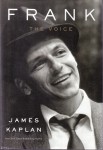Frank, the Voice by James Kaplan (Doubleday, 2010. ISBN 978-0-385-51804-8)
I’m not a fan of serials. Oh sure, I own a collection of old Buck Rogers episodes from the 1930s and ’40s. And those bits and pieces of entertainment do, when watched sequentially, form a serial. But I can also, if I desire, watch DVD after DVD and, in the end, see the entire story. I thought, when I began reading Frank, the Voice I was beginning a biography of Mr. Sinatra’s entire life. I was wrong: It’s only half a book.
Kaplan does a thorough job of painting a mostly unflattering half-portrait of one of the most controversial and influential singers of the 20th century. Primarily a story of Frank’s early years and a chronicle of his first two marriages (the first to Nancy Barbato, the mother of his three children (though he was married four times, he only fathered children with Nancy), and the second, to film star Ava Gardner) the book ends the year I was born, 1954 though Sinatra’s life and long career in music (and film) was just beginning. I didn’t realize I was reading a truncated biography until somewhere in the Gardner years, which seemed to drag on a bit despite the titillating details of their love life and the near-constant battles between the two stars.
At times, the writing is poignant and original: at times, Kaplan’s prose reverts to a Kitty Kelly-like lowbrow effort, using slang or street terms to flesh out the tale. Such linguistics might work in a tabloid newspaper article but just don’t seem appropriate in a book labeled “a biography worthy of the man” as declared by one blurb on the back cover. Still, it’s hard to keep your eyes off a train wreck and that’s where Kaplan’s story, at its best, places readers: In an armchair across from The Voice as he and Ava (and to a lesser extent, Nancy) love and hate each other until they’re exhausted.
In the end, the author paints Sinatra as a brilliant vocalist with a complicated set of wants and needs: A man very clearly, despite flashes of decency and empathy, bent on creating his own place in the world come hell or high water. The passages dealing with Sinatra’s relationship with Gene Kelly, Montgomery Clift, and Lauren Bacall are classic and open the reader’s eyes to the person Frank Sinatra could have been had he been given a different childhood and upbringing. Facinating and, for the most part, well written, I still feel a bit cheated at only getting half the story from this book. If Kaplan’s at work on the concluding years of the singer’s life, I’m not sure I’m willing to invest another twenty bucks on the sequel.
OK. That’s not true. I love a train wreck as much as the next guy and Kaplan, despite the book’s flaws, has got me hooked.
4 stars out of 5.



